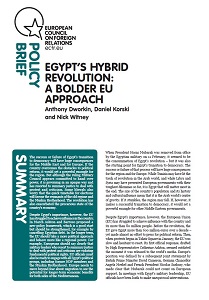EGYPT’S HYBRID REVOLUTION: A bolder EU Approach
EGYPT’S HYBRID REVOLUTION: A bolder EU Approach
Author(s): Anthony Dworkin, Daniel Korski, Nick Witney
Subject(s): International relations/trade, Security and defense, Peace and Conflict Studies
Published by: ECFR European Council on Foreign Relations
Keywords: Egypt Revolution, Arab Spring;
Summary/Abstract: The success or failure of Egypt’s transition to democracy will have huge consequences for the Middle East and for Europe. If the country overcomes the obstacles to political reform, it would set a powerful example for the region. But although the ruling Military Council appears committed to hand over power, it is governing in an opaque way and has resorted to summary justice to deal with protest and criticism. Some liberals also worry that the quick timetable for elections will favour the remnants of the old regime and the Muslim Brotherhood. The revolution has also exacerbated the precarious state of the country’s economy. // Despite Egypt’s importance, however, the EU has struggled to achieve influence in the country. In March Ashton and Barroso proposed a new policy framework, which is a good start but should be strengthened, for example by cancelling Egyptian debt. In the longer term, the EU should take a more political approach and behave more like a regional power. For example, Europeans should say clearly that military leaders who resort to summary justice to deal with protest and criticism are violating fundamental political rights. EU officials must also be ready to engage with all Egypt’s political groups, including former NDP members and the Muslim Brotherhood. Europe needs to move beyond fear about migration to see the potential for longer-term economic benefits for both sides of the Mediterranean.
Series: ECFR Policy Briefs
- Page Count: 16
- Publication Year: 2011
- Language: English
- Content File-PDF

